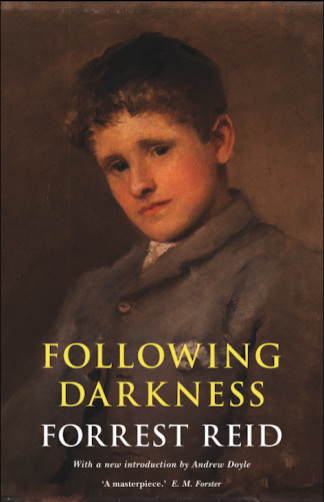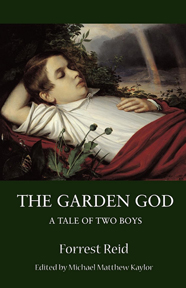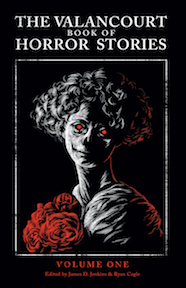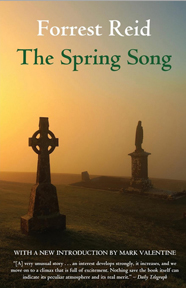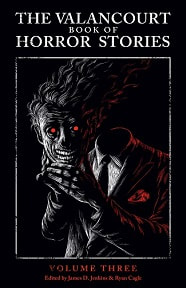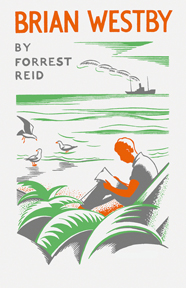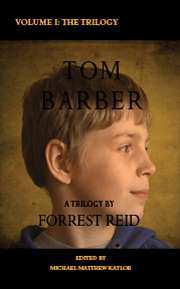|
BOOK DETAILS
Trade paper ISBN-13: 978-1939140531 List Price: $19.99 U.S. Pages: 266 Published: 2013 |
Following Darkness (1912)
Forrest Reid With a new introduction by Andrew Doyle Due to copyright restrictions, this title is only available to customers in the U.S. and Canada.
Book Description
When Following Darkness first appeared in 1912, critics did not know what to make of it. Sentimental novels of childhood and adolescence were popular in the Victorian and Edwardian eras, but here was something completely new in English fiction: a book that explored a teenager’s thoughts and emotions with unflinching honesty. One leading critic denounced the novel’s protagonist Peter Waring as a ‘subject for the pathologist rather than the novelist’, an ‘evil’ character who ‘unutterably disgusts’, and the book’s allusions to Peter’s sexual awakening and his rejection of Christ disturbed contemporary readers. Following Darkness is the story of sixteen-year-old Peter’s conflict with his staunchly religious father, whose religion and values Peter rejects with contempt, his burgeoning friendship with Owen Gill, and his growing passion for Katherine Dale. With keen psychological insight, Reid creates in Peter a complex and fascinating character: morally ambiguous, deeply flawed, snobbish, conceited and selfish, yet ultimately sympathetic. Acclaimed as a masterpiece by E.M. Forster and a possible influence on Joyce’s A Portrait of the Artist as a Young Man (1916), Following Darkness was unlike any novel that had preceded it, and it remains one of Forrest Reid’s most interesting works. This edition, the first since 1912, includes a new introduction by Andrew Doyle. |
reviews
‘A masterpiece.’ - E. M. Forster
‘[A] strange, sinister, and unforgettable story.’ -Manchester Guardian
‘Forrest Reid has . . . beautiful, rhythmical prose, a true and permanent voice.’ - John McGahern
‘None of our contemporaries can describe childhood and youth as truly as he does.’ - V. S. Pritchett
“Few of [Reid’s] works are more poignant than his 1934 novel, Brian Westby.” – Huffington Post
‘[A] strange, sinister, and unforgettable story.’ -Manchester Guardian
‘Forrest Reid has . . . beautiful, rhythmical prose, a true and permanent voice.’ - John McGahern
‘None of our contemporaries can describe childhood and youth as truly as he does.’ - V. S. Pritchett
“Few of [Reid’s] works are more poignant than his 1934 novel, Brian Westby.” – Huffington Post
ALSO AVAILABLE THROUGH ONLINE RETAILERS
|
EBOOK
Kindle US |
MORE TITLES BY THIS AUTHOR
SEE THE COMPLETE LIST OF TITLES HERE
AUTHOR BIOGRAPHY
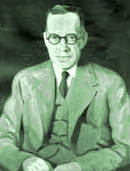
Forrest Reid was born in Belfast in 1875, the youngest of a large family. His father died when he was still a young child, and much of his upbringing therefore fell to his rather conventional mother and his elder sisters. As a youth he felt ill at ease with what seemed the narrow piety of his family’s Presbyterian faith, and their solid middle-class values. After a local schooling, he was apprenticed at age eighteen to the tea trade. The work was not demanding, and Reid coped with the tedium of commercial life by retreating into a dream world of wonder and beauty, inspired by his reading of the Greek classics.
Reid later disowned his first two novels, The Kingdom of Twilight (1904) and The Garden God (1905). The latter novel risked controversy with its portrayal of romantic friendship between two boys; Reid dedicated it to his literary idol Henry James, who was outraged and never spoke to Reid again. After the death of Reid’s mother, a small legacy enabled him to devote himself more fully to his writing, and in the 1910s he published a string of excellent, though not commercially successful novels, including The Bracknels (1911), Following Darkness (1912) (said to have been an influence on Joyce’s A Portrait of the Artist as a Young Man), At the Door of the Gate (1915), The Spring Song (1916), and Pirates of the Spring (1919).
The best of Reid’s works, though, came later in life, beginning with Uncle Stephen (1931), which, with The Retreat (1936) and Young Tom (1944), made up the Tom Barber trilogy, regarded by many as his masterpiece; the final book in the trilogy won the James Tait Black Memorial Prize as the best novel published in 1944. Reid’s other mature work includes Brian Westby (1934), inspired by Reid’s friendship with nineteen-year-old Stephen Gilbert, who also went on to become a novelist, and Peter Waring (1937) and Denis Bracknel (1947), rewritten versions of Following Darkness and The Bracknels, respectively. Reid died in 1947, critically well-regarded, but never having achieved the widespread popular recognition he deserved. When Valancourt Books reprinted The Garden God in 2007, all of Reid’s books were out of print. Valancourt is now in the process of restoring Reid’s best works to print.
Reid later disowned his first two novels, The Kingdom of Twilight (1904) and The Garden God (1905). The latter novel risked controversy with its portrayal of romantic friendship between two boys; Reid dedicated it to his literary idol Henry James, who was outraged and never spoke to Reid again. After the death of Reid’s mother, a small legacy enabled him to devote himself more fully to his writing, and in the 1910s he published a string of excellent, though not commercially successful novels, including The Bracknels (1911), Following Darkness (1912) (said to have been an influence on Joyce’s A Portrait of the Artist as a Young Man), At the Door of the Gate (1915), The Spring Song (1916), and Pirates of the Spring (1919).
The best of Reid’s works, though, came later in life, beginning with Uncle Stephen (1931), which, with The Retreat (1936) and Young Tom (1944), made up the Tom Barber trilogy, regarded by many as his masterpiece; the final book in the trilogy won the James Tait Black Memorial Prize as the best novel published in 1944. Reid’s other mature work includes Brian Westby (1934), inspired by Reid’s friendship with nineteen-year-old Stephen Gilbert, who also went on to become a novelist, and Peter Waring (1937) and Denis Bracknel (1947), rewritten versions of Following Darkness and The Bracknels, respectively. Reid died in 1947, critically well-regarded, but never having achieved the widespread popular recognition he deserved. When Valancourt Books reprinted The Garden God in 2007, all of Reid’s books were out of print. Valancourt is now in the process of restoring Reid’s best works to print.

